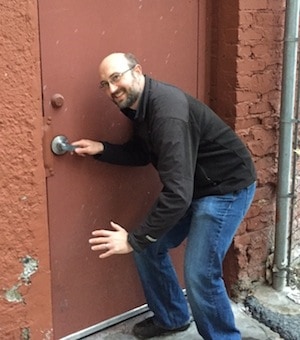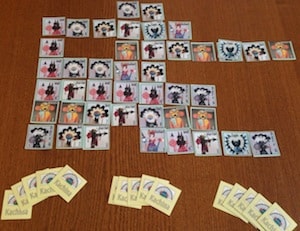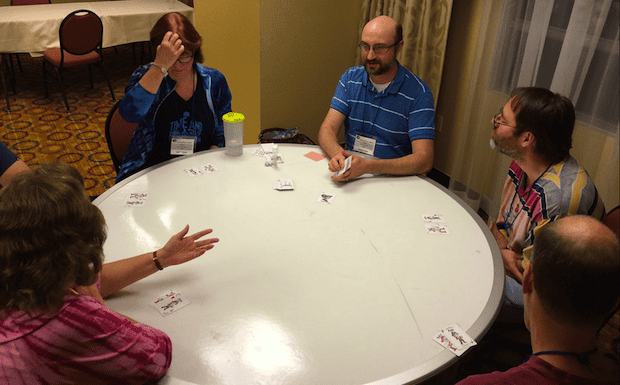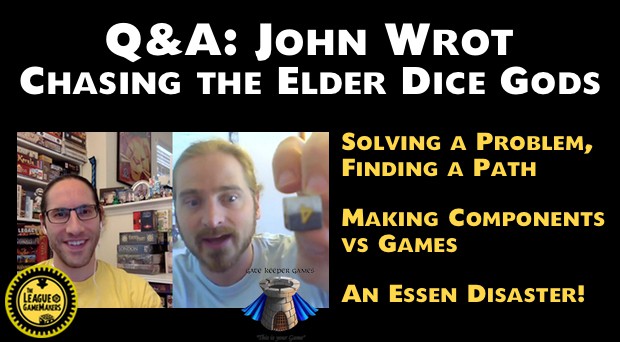
Guest post by Scott Caputo, who previously wrote the piece Stepping into the Big Leagues at Essen
I have had the good fortune of getting published in two hobbies of mine: board games and poetry. Despite the differences between these two fields, the process of getting published was remarkably similar. In both cases, I got published through the back door.
Most of us have probably tried to get published through the front door. “Send us a pitch via email.” A typical publisher might get hundreds if not thousands of pitch emails every year. Somebody has to sift through all those emails trying to choose a few dozen people to get prototypes from and of those dozen prototypes, maybe one or two will actually get published that way. Not the best odds for a new designer.
Or maybe you’ve tried to meet up with a publisher at a convention. In my last post, I talked about getting appointments with publishers at Essen. I felt honored to get those appointments, but in reality the big companies probably met with 50+ designers at the fair, and those designers were probably some of the most successful, highly published designers in the industry. Again, not the best odds for a new designer.
THE BACK DOOR
Luckily, there is another way to get published and that is through the back door. What is the back door? It’s when the publisher knows you personally and is willing to take a look at your game because they know you. You skip through any initial filtering a publisher may have set up to make their lives easier and instead, you get a personal look from a decision maker. Another advantage of the back door is you might learn about an opportunity that hasn’t even been advertised yet.
KACHINA

In the case of my first published game, I entered Kachina into the Kublacon Board Game Design contest. Kachina did not win, but one of the judges liked my game so much, she asked to show it to a friend of hers who was starting a board game company, Bucephalus Games. She put my game directly into the hands of the company CEO. No need for the usual process. No pitch email required.
HOLY TRINITY OF CHILIS

In the case of my first published book of poetry, “Holy Trinity of Chiles,” I stayed in touch with former poetry teacher and when she decided to start her own press, I volunteered to help her read manuscripts for her yearly book contests. At some point, after reading my poems and seeing me grow as a writer, she surprised me by saying, “I’d like to publish you, too.” No query letter needed.
MY NEW GAME
My most recent game I signed also came from a personal connection. The game has yet to be announced, so I cannot identify the publisher, but I can say that I met the publisher over many years at a local board game convention. Our relationship started by playing games together. A few years later, I helped playtest his games and he helped playtest mine. This past year, I decided to test the waters and asked if he liked to see one of my games. He was already familiar with the prototype, though he hadn’t played it yet. He agreed to meet with me. After playing my game, he decided to sign it and now we are in the midst of production.
Let me say that any number of great connections will do you no good if your games are bad, so obviously you need to work on your craft of making great games. But given two equally talented designers, I firmly believe the one who is better at networking will get published first.

Playtesting one of my games at Celestispiel 2014
TIPS FOR BACK DOOR ENTRY:
MAKE CONNECTIONS/FRIENDS WITH PUBLISHERS
Try to meet as many publishers face to face as possible. To do this, you need to go where publishers hang out which might be at conventions or Protospiel events, or even at your local game store. Get to know the publishers in your local area. Play games with publishers. Volunteer to playtest their games they need help playtesting. Usually publishers always need that kind of help.
VOLUNTEER IN THE COMMUNITY
One way to make a name for yourself in the board game industry is to get involved. Volunteer at local conventions and help run events. You could volunteer to demo games for a publisher you want to meet. As you become an organizer, you are likely to meet many other designers and publishers who will start to learn your name. To tap into the board game designer community (besides reading the League of Gamemakers), check out places such as:
- The Board Game Designers Forum
- The Board Game Design Forums on BoardGameGeek
- The Unpublished Games Network
KEEP YOUR CONTACTS ALIVE
If you tend to see certain designers and publishers at certain events every year, keep going to those events and keep talking to those people. Ask them what they are working on. Designers can become publishers. Small publishers can become big publishers. Let them know about what you are working on. They may ask for more details, or they may just wish you luck. In any case, relationship building takes time.
A NETWORK TAKES TIME TO BUILD
Getting published through the back door requires a long view. It can take years to build up a network of contacts with other designers and publishers. However, once your network is strong, you will become aware of many more opportunities and will have options of where you pitch your games.
(KICK)START YOUR OWN THING
One sure way to get published is to become your own publisher. This option is not for everyone and there are many others who can suggest strategies for running a successful Kickstarter campaign or starting your own business. But once you are a publisher, you might find yourself at events with other publishers. Again, as they get to know you, you might find ways to work together. If becoming a publisher is not your thing, you could always start your own local convention. Maybe your town does not have a Protospiel event yet. If you start some new event, publishers may want to be part of it.
YOU WILL MAKE A NAME FOR YOURSELF
Once a publisher starts to know you and your games personally and they see you grow as a game designer, they may ask you to see your games. They may be willing to take a chance on you. They may want to see you succeed because they like you. You will cease to be an unknown name on one of a thousand emails, and instead, you will be a known commodity, someone they feel they can bank on, and that can make all the difference.
What’s your story? How have you made a name for yourself in the game industry? Feel free to share below in the comments!








